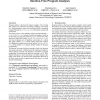Free Online Productivity Tools
i2Speak
i2Symbol
i2OCR
iTex2Img
iWeb2Print
iWeb2Shot
i2Type
iPdf2Split
iPdf2Merge
i2Bopomofo
i2Arabic
i2Style
i2Image
i2PDF
iLatex2Rtf
Sci2ools
105
click to vote
ICFP
2003
ACM
2003
ACM
Iterative-free program analysis
Program analysis is the heart of modern compilers. Most control flow analyses are reduced to the problem of finding a fixed point in a certain transition system, and such fixed point is commonly computed through an iterative procedure that repeats tracing until convergence. This paper proposes a new method to analyze programs through recursive graph traversals instead of iterative procedures, based on the fact that most programs (without spaghetti GOTO) have wellstructured control flow graphs, graphs with bounded tree width. Our main techniques are; an algebraic construction of a control flow graph, called SP Term, which enables control flow analysis to be defined in a natural recursive form, and the Optimization Theorem, which enables us to compute optimal solution by dynamic programming. We illustrate our method with two examples; dead code detection and register allocation. Different from the traditional standard iterative solution, our dead code detection is described as a simple ...
Control Flow Graphs | ICFP 2003 | Optimal Register Allocation | Programming Languages | Recursive Graph Traversals |
Related Content
| Added | 13 Dec 2009 |
| Updated | 13 Dec 2009 |
| Type | Conference |
| Year | 2003 |
| Where | ICFP |
| Authors | Mizuhito Ogawa, Zhenjiang Hu, Isao Sasano |
Comments (0)

